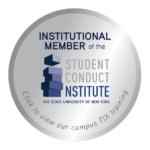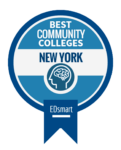Student Handbook
Genesee is committed to the success of all students. Faculty, staff and advisors are available to provide guidance and support and are committed to helping students as they progress toward degree completion.
Academic Computing Policies
Genesee Community College has a number of policies relating to computer use. Please take the time to become familiar with them. If you have questions about these policies, feel free to stop into the Student Resource Center (T212) on campus or to contact Patricia Chaya, Dean of Students.
Access and Accommodation Services
GCC does not discriminate on the basis of age, race, color, religion, creed, national origin, sex, marital status, sexual preference, veteran status, domestic violence status or disability in its educational programs, activities, admissions, and employment.
The Americans with Disabilities Act (ADA) of 1990 prohibits discrimination on the basis of a disability and mandates that equal access and reasonable accommodations be provided to qualified individuals with disabilities.
Under the ADA any person with a physical or mental impairment that substantially limits one or more of his/her major life functions is defined as disabled. Students with disabilities may not be segregated and are fully included in the institution’s existing programs and activities.
GCC provides assistance to students with disabilities, assists faculty and staff members who interact with the students and work closely with community agencies. It is the student’s responsibility to identify his/her need for services and provide the appropriate documents.
Substance Abuse Prevention

Career Services
In support of Genesee Community College’s mission and vision, Career Services is committed to providing assistance in navigating career and educational planning. Our office develops and sustains positive relationships with students, alumni, faculty, staff, employers, and our community members. These meaningful partnerships, in addition to customized educational experiences, are designed to coach, prepare, and support individuals to become career confident citizens in a global work environment.
Discrimination Complaint Procedures
Genesee Community College, in its continuing effort to seek equity in education and employment and in support of federal and state anti-discrimination legislation, has adopted a complaint procedure for the prompt and equitable investigation and resolution of allegations of unlawful discrimination on the basis of race, color, national origin, religion, creed, age, sex, sexual orientation, disability, gender identity, familial status, pregnancy, predisposing genetic characteristics, military status, domestic violence victim status, or criminal conviction.
Non-Discrimination Policy (PDF)
How to File a Discrimination Complaint (PDF)
Emergency Procedures
Basic emergency procedures are designed to enhance the protection of lives and property through effective use of college and community resources. Emergencies may be sudden and without warning and the succession of events can be unpredictable. Visit the Public Safety page to learn how to stay safe on campus.
FERPA Consent – Authorization for Release of Information
Student Proxy Instructions (PDF)GCC Student Academic Issues of Concern
- This is NOT for final grade appeals, rather ONLY for issues regarding academic concerns such as grades/plagiarism/cheating during the academic semester:
- Communicate with the faculty member with whom you have the issues.
- If not resolved, contact with the Director of that curriculum area. See list of below for contact names.
- If there is no resolution, request an appointment with the appropriate Academic Dean:
- Dean of Math, Science and Career Education – Dr. Rafael Alicea-Maldonado (Dr. RAM), RAlicea-Maldonado@genesee.edu
- Dean of Human Communication and Behavior – Mr. Tim Tomczak, TPTomczak@genesee.edu
- Dean of Distributed Learning (online classes)– Mr. Ed Levinstein, EJLevinstein@genesee.edu
- If, after taking steps 2 through 4, AND you have been accused of academic dishonesty, contact the Dean of Students (Ms. Patty Chaya, PEChaya@genesee.edu) to discuss the possibility of a hearing, within five days of talking to the appropriate academic dean.
Academic Dishonesty:
- Cheating is obtaining or intentionally giving unauthorized information to create an unfair advantage in an examination, assignment, or classroom situation.
- Plagiarism is the act of presenting and claiming words, ideas, data, programming code or creations of others as one’s own. Plagiarism may be intentional – as in a false claim of authorship (including AI generated) – or unintentional – as in a failure to document information sources using MLA (Modern Language Association), APA (American Psychological Association) or other style sheets or manuals adopted by instructors at the College. Presenting ideas in the exact or near exact wording as found in source material constitutes plagiarism, as does patching together paraphrased statements without in-text citation. The purchasing or sharing of papers or projects between students or the re-use of papers or projects submitted for more than one assignment or class also constitutes plagiarism.
- Disciplinary action may include a failing grade on an assignment or test, a failing grade for the course, suspension or expulsion from the college, as described in the Code of Conduct.
- For issues such as dispute of a FINAL course grade, graduation requirements and transfer credit, please fill out the Student Grade Appeal form. Please see additional information under Student Academic Appeals at Policies and Procedures.
| Academic Dean | Academic Director | Course Prefix |
|---|---|---|
|
Tim Tomczak |
Maryanne Arena |
ART, MUS, THE, DAN, PHO |
|
Dr. Rafael Alicea-Maldonado |
Jim Bucki |
CIS, CSN, EGR |
|
Dr. Rafael Alicea-Maldonado |
Carrie Caccamise |
VET |
|
Dr. Rafael Alicea-Maldonado |
Chris Caputi |
PTA |
|
Tim Tomczak |
Barry Chow |
ANT, ASL, COM, ESL, FRE, GEO, HIS, PHI, POS, PSY, SOC, SPA |
|
Dr. Rafael Alicea-Maldonado |
Becky Dziekan |
ATH, HED, PED, |
|
Dr. Rafael Alicea-Maldonado |
Marirose Ethington |
AST, BIO, CHE, MET, PHB, PHY |
|
Dr. Rafael Alicea-Maldonado |
Chris Kemp |
MATH, PVO |
|
Dr. Rafael Alicea-Maldonado |
Lina LaMattina |
ACC, BLM, BUS, CPS, ECO, FBM, OFT, THM |
|
Dr. RAM |
Deb Penoyer |
NUR |
|
Tim Tomczak |
Jodi Scondras |
CRJ, EDF, HUR, HUS |
|
Tim Tomczak |
Jonelle Torsevia |
CEP, CIN, ENG, FYE, JOU, LIT, REA, SPE |
|
Dr. Rafael Alicea-Maldonado |
Maureen Welch |
RCP |
|
Dr. Rafael Alicea-Maldonado |
Karyn Bryson |
PLG |
Hate Crimes/ Bias Related Incidents
Genesee Community College is committed to retaining an environment in which the dignity and value of all members of the College community are respected. Bias related crimes against anyone on campus is considered a criminal act under the hate crime law and will not be tolerated. Bias related or hate crimes subverts the mission of the College and undermines the educational process.
(a) intentionally selects the person against whom the offense is committed or intended to be committed in whole or in substantial part because of a belief or perception regarding the race, color, national origin, ancestry, gender, religion, religious practice, age, disability or sexual orientation of a person, regardless of whether the belief or perception is correct; or
(b) intentionally commits the act or acts constituting the offense in whole or in substantial part because of a belief or perception regarding the race, color, national origin, ancestry, gender, religion, religious practice, age, disability or sexual orientation of a person, regardless of whether the belief or perception is correct.
GCC is required to annually report campus crime statistics to the U.S. Department of Education’s website at https://ope.ed.gov/campussafety/#/
REPORTING, RESPONSE AND SECURITY PROCEDURES FOR ALL RELATED INCIDENTS HATE CRIMES AND/OR BIAS: The College encourages the reporting of all such situations to:
- GCC Campus Safety Department at 585-345-6500,
- Dean of Students at 585-343-0055 ext 6219
- Title IX Coordinator 585-343-0055 ext 6514.
Nondiscrimination Policy
Nondiscrimination Policy (PDF)Repeating Courses
Students may repeat a course for which credit has been received with a grade of A- or lower. If a higher grade is earned upon repeating a course, only the higher of the two grades will be computed to determine a cumulative grade point average (GPA), although both grades will be recorded on transcripts. A student may not repeat a course for which he or she has already received an “A” grade.
No course may be repeated solely in order to increase the number of credits earned in courses where the credit hours have been changed. The course will only be counted once toward graduation requirements and computation of total hours earned.
Full-time students who elect to repeat a course for which credit has already been received should register for 12 credit hours relevant to their degree program in addition to the repeated course in order to remain eligible for TAP awards. Full-time students who register for remedial courses should also register for at least six credits of non-remedial credit courses. However, during the first term of funding, a full-time student need only register for at least three credits of non-remedial credit courses. Students at community colleges are eligible for a total of six semesters of TAP funding.
Student Code of Conduct
Read Student Code of Conduct (PDF)Student Bill of Rights
Read Student Bill of Rights (PDF)Technical Support
Technical Support Resources – Help is just a click away!Title IX Policies and Procedures
Read Title IX Policies and ProceduresTitle IX Training
Transfer Services
Thousands of students have begun their college education at GCC, transferred to a 4-year school, and gone on to earn bachelor’s, master’s and doctorates in a wide variety of fields. The coursework in our associate’s degree programs is comparable to that of the freshman and sophomore year at most 4-year schools. You can spend your first two years at Genesee and then transfer the credits you earn here to a four-year school of your choice to complete your degree. Thinking of transferring? Learn more about transferring procedures.
Use of College-Assigned Email for Official and Instructional Correspondence
Read the Policy on Use of College-Assigned Email (PDF)Withdrawal
Withdrawal from a Course
Students may officially withdraw from a course through the ninth week of classes during a full semester course and prior to the completion of 9/16 of a course during the summer or special classes. Withdrawal deadlines are published each semester. In order to officially withdraw, a student may withdraw online (through myGCC) or by submitting a registration change form to the Records Office. It is the student’s responsibility to properly withdraw. Withdrawal grades will be assigned as follows:
- Official withdrawals received by the Records Office prior to the census date (i.e. the end of the third week of classes) will result in the course being deleted from the student’s record and no grade will be recorded
- Official withdrawals received by the Records Office after the census date and prior to the end of the ninth week (specific date published each semester) will result in a grade of “W”
- Formal withdrawal may not be initiated after the ninth week of classes (specific date published each semester). Failure to complete course requirements will result in a grade of “F”
- Refunds are not given without advanced withdrawal notice from the student. Refund and charge reductions are determined by the date of written withdrawal notice. The policy regarding refund of tuition and fees is detailed in the “Admissions and Financial Aid” section of this catalog
Withdrawal from the College
Students finding it necessary to withdraw from the College before the end of a term in which they are enrolled must follow established withdrawal procedures. Withdrawals may be completed online (through myGCC) or in person in the Records Office. Refunds are given on a pro rata basis and are not given without advance withdrawal notice from the student. The student should contact the Business Office immediately if he/she is considering withdrawal from the College.


